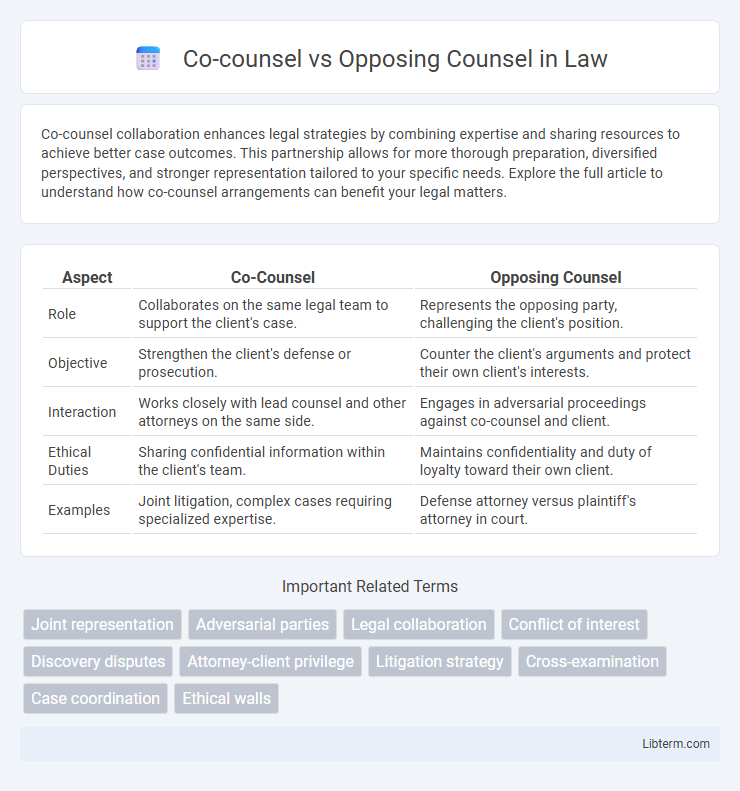Co-counsel collaboration enhances legal strategies by combining expertise and sharing resources to achieve better case outcomes. This partnership allows for more thorough preparation, diversified perspectives, and stronger representation tailored to your specific needs. Explore the full article to understand how co-counsel arrangements can benefit your legal matters.
Table of Comparison
| Aspect | Co-Counsel | Opposing Counsel |
|---|---|---|
| Role | Collaborates on the same legal team to support the client's case. | Represents the opposing party, challenging the client's position. |
| Objective | Strengthen the client's defense or prosecution. | Counter the client's arguments and protect their own client's interests. |
| Interaction | Works closely with lead counsel and other attorneys on the same side. | Engages in adversarial proceedings against co-counsel and client. |
| Ethical Duties | Sharing confidential information within the client's team. | Maintains confidentiality and duty of loyalty toward their own client. |
| Examples | Joint litigation, complex cases requiring specialized expertise. | Defense attorney versus plaintiff's attorney in court. |
Understanding the Role of Co-Counsel
Co-counsel plays a collaborative role by working alongside the primary attorney to strengthen case strategy, share expertise, and manage complex legal issues. Unlike opposing counsel, who represent different parties with conflicting interests, co-counsel partners share the goal of achieving the best outcome for the same client. Effective co-counsel relationships enhance case preparation, legal research, and courtroom advocacy through combined resources and specialized skills.
Defining Opposing Counsel in Legal Proceedings
Opposing counsel refers to the attorney representing the adverse party in a legal proceeding, tasked with challenging the claims and evidence presented by the plaintiff or defense. Their role is to advocate for their client's position by cross-examining witnesses, presenting counterarguments, and filing motions to protect their client's interests. Effective opposing counsel must possess thorough knowledge of the case facts, relevant laws, and procedural rules to strategically counter the opposing side's legal strategies.
Key Responsibilities of Co-Counsel
Co-counsel collaborates closely with the lead attorney to share case strategy development, evidence analysis, and client communication, ensuring a cohesive legal approach. Their key responsibilities include conducting in-depth legal research, preparing and reviewing pleadings, and assisting in trial preparation to strengthen the case presentation. Co-counsel also plays a critical role in negotiating settlements and managing discovery processes, complementing the efforts of opposing counsel through cooperation and strategic alignment.
Duties and Ethics of Opposing Counsel
Opposing counsel has an ethical duty to advocate zealously for their client while maintaining honesty and fairness, including full disclosure of material facts and refraining from misleading the court or opposing parties. They must respect the confidentiality of their client's information and avoid conflicts of interest, ensuring professional integrity throughout litigation. Their responsibilities also encompass abiding by procedural rules and displaying civility to promote the justice system's efficiency and credibility.
Collaboration Strategies Between Co-Counsels
Co-counsel collaboration strategies hinge on clear communication protocols, division of responsibilities based on expertise, and leveraging shared case management tools to enhance efficiency. Establishing regular strategy sessions and utilizing secure, centralized document repositories help co-counsels synchronize efforts and avoid duplicative work. Effective collaboration between co-counsels not only streamlines case preparation but also strengthens litigation outcomes through cohesive argument development.
Navigating Interactions with Opposing Counsel
Navigating interactions with opposing counsel requires a clear understanding of their role as advocates for the other party, emphasizing professionalism and strategic communication to maintain productive negotiations. Employing effective negotiation techniques and adhering to ethical standards ensures that conflicts are managed efficiently while protecting client interests. Recognizing the contrast with co-counsel collaboration, which focuses on teamwork within the same side, helps tailor approaches suited to the adversarial nature of opposing counsel engagements.
Communication Protocols: Co-Counsel vs Opposing Counsel
Co-counsel communication protocols emphasize collaboration, confidentiality, and coordinated strategy development through frequent meetings and secure information sharing to ensure unified case representation. Opposing counsel communication follows strict ethical guidelines, maintaining professionalism and clear boundaries to facilitate negotiation, discovery exchanges, and dispute resolution without compromising client interests. Effective communication protocols in both relationships are critical for advancing case objectives while adhering to legal and ethical standards.
Conflict Resolution When Facing Opposing Counsel
Co-counsel and opposing counsel must navigate conflict resolution strategically to maintain professional integrity and achieve favorable outcomes. Effective communication, clear boundaries, and adherence to ethical standards are essential when addressing disputes or disagreements during litigation. Employing negotiation techniques and seeking collaborative solutions can help mitigate conflicts, ensuring smoother case progression despite opposing interests.
Benefits of Effective Co-Counsel Partnerships
Effective co-counsel partnerships enhance case strategy by combining diverse legal expertise and resources, leading to more comprehensive case preparation and stronger courtroom advocacy. These collaborations improve communication efficiency, reduce errors, and optimize workload distribution, ultimately increasing the chances of favorable case outcomes. Leveraging the strengths of co-counsel fosters innovative legal solutions and boosts client confidence through coordinated, well-rounded representation.
Common Challenges with Opposing Counsel in Litigation
Common challenges with opposing counsel in litigation include communication barriers, differing negotiation tactics, and conflicting case strategies. These issues often lead to delays, increased costs, and heightened tensions during case proceedings. Effective resolution requires maintaining professionalism, clear documentation, and employing skilled negotiation to navigate disputes efficiently.
Co-counsel Infographic

 libterm.com
libterm.com